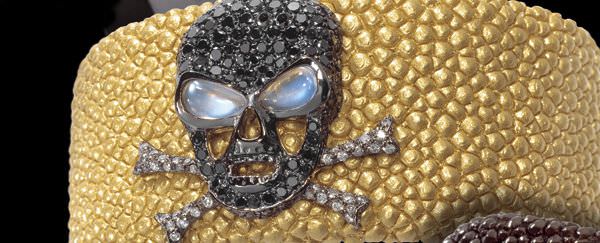
We cannot open a fashion or watch magazine today without seeing the word ‘glamour’. Because of its frequent use, the word resembles some sort of magical spell, as if by merely pronouncing the word, would give the object (or the person) a brilliant and surreal aura, endowing it with a power of fascination that transcends ordinary and daily life. Using the word ‘glamour’ makes an object exceptional and highly desired.
Actually, the use of the word ‘glamour’ is completely in keeping with its etymological roots (although those who use it indiscriminately probably do not realize this). Linguists may certainly argue about this point, but it would seem that the word ‘glamour’ comes from the word ‘grammar’ or ‘grammaye’ that was used in Scottish English. The word ‘grammar’ itself had several meanings and notably was used to mean ‘spell’, as in ‘casting a spell’ on someone (‘I put a spell on you’, as the song goes) or of creating magical enchantment.
We all know, since childhood, that witches and sorceresses scribbled their magical formulas in a ‘grimoire’ a French term meaning ‘book of magic spells’ that itself was derived from the word ‘grammaire’. In the beginning, ‘grammaire’ referred to Latin grammar, which was not understood by the common people but was reserved for people who ‘knew’ and possessed ‘magical’ powers.
From then on, the word ‘grammar’, or in French ‘grimoire’, designated the physical magic book, in which formulas necessary to cast spells were written down. Later, in Scottish English, the word simply came to mean the magic spell itself, or enchantment, unexplained fascination, and inexplicable attraction. Moreover, isn’t it customary for Catholics to pray in order ‘to renounce the glamour of evil’?
Today, people have undoubtedly forgotten ‘glamour’s’ magical (and hence dangerous and evil) origins, but the word remains unconsciously charged with uncommon power. ‘Glamour’ is something mysteriously exciting, endowed with a strong power of attraction, as well as with a somewhat deadly and quasi-sexual attraction.
We now better understand the considerable success of the word ‘glamour’ and why it is used for any and all situations, as if simply saying the word would have a magical effect on the consumer. We also understand better why it is so strongly tied to everything that glitters, especially the diamond. The eternal magical attraction of the diamond is not rational. It is purely symbolic, which is why this gemstone ‘does not have a price’.
But we can also use ‘glamour’ to describe an artisanal practice pushed to perfection, as we demonstrate on the following pages in the article about Olivier Vaucher, an engraver who gives true ‘glamour’ to every piece he touches.
To sum it up, ‘glamour’ is something that mysteriously fascinates us, that has no rational explanation and that seems to be somewhat, or totally, inaccessible to us.
Each person is free to find ‘glamour’ in his/her own way. There is not one ‘glamour’. There are many.
Photo: de Grisogono
Source: Europa Star October-November 2007 Magazine Issue





